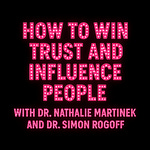You might have gathered by now that I have penchant for discussing toxic workplaces, as is the case in this podcast episode with Dr. Shami Barathan. For those of us who have one of those, we spend most of our week in a workplace, physical or virtual, and the last thing any of us need is a horrible place of work.
The episode covers the following topics:
warning signs of a toxic workplace
why we don’t see the signs until it’s too late
conditions for creating a toxic workplace environmnent
how our relationship with authority influences behaviour
how one person gains power to influence a culture
how to transform a workplace culture (and why we can’t)
realistic strategies for working within these workplaces without enabling them
discerning trustworthy organisations and people
Our workplaces and the quality of the relationships in them have a significant influence on our wellbeing. No one comes to work thinking about relationships as a separate body of work required to facilitate the actual work. There are no KPIs that measure the health and strength of workplace relationships and their correlation to revenue. Relationships at work deserve effort to foster the conditions that ensure time at work is meaningful and productive.
People have been telling me about their workplace woes for decades, long before I described myself as a narcissism hacker. While I was intuitive and could convey my understanding of their situation and its impact in ways that helped them feel understood, I wasn’t the greatest helper because I would advise them on what I thought they should do. This is the last thing any of us should do when presented with someone else’s problem (except in emergency situations). We will never have to wear the consequences of following our well-intended advice that we persuasively doled out based on little information.
It’s far more empowering to be a soundboard for others so they can hear their own thoughts out loud and be supported to make sense of their own situation. They can come away with insights that resolve their issue or clarity about their next steps that emerged from this collaborative process. While this isn’t therapy, it can feel therapeutic. As a coach, helping involves facilitating change - change in mindset, perception, emotional response and even behaviour as long as that person is ready for it.
Did you know that paid subscribers can reach me via Substack messaging for a brief 1:1 soundboard chat about your own challenging personal or professional situation. Consider upgrading your subscription if you need to talk an issue out.
When helping involves professional relationships within the realm of abuse, bullying and sabotage, my clients can have a very hard time accepting the severity of their current situation and are convinced that they can turn it around for the better with the right strategies. This delusion is understandable given their investment in their career development and desired professional trajectory. It’s easier to remain in denial than confront the reality of an unwelcome, unplanned Plan B.
When clients finally accept that their situation isn’t going to improve and the violating behaviours won’t stop without an intervention, the work together becomes more intensive, methodical and analytical to carefully determine the best way forward given their resources, skills, connections, risks, opportunities and confidence. Part of the work is preparing clients for what to expect when they carry out their evidence-informed plan of action intending to interrupt or prevent another violation, and restore the balance of power. The other part is skilling up clients to respond confidently to predicted backlash and maintain control of their situation.
Workplace relationships are part of a bigger system that can also be seen as a workplace ecology. Unhealthy workplace relationships often mirror dysfunctional or unhealthy family relationships. It’s a lightbulb moment for every client when they discover that their toxic dynamic with a colleague parallels the dynamic with one of their parents. Making changes that successfully address issues in the professional relationship can give the client confidence and competence to begin to make changes in their family relationships. Those changes might be transformative improvements in the adult-parent relationship, acceptance that the parent will never change, changes in emotional response and behaviour, or change that involves suspending contact with that parent temporarily or indefinitely.
Deliberate, planned change can be difficult, especially because it involves taking risks, strategically disrupting the way things are, managing the discomfort of temporary instability, resisting the urge to give in to the familiar, unsatisfying old way, and navigating a new reality of predicted and unpredicted changes. Having someone alongside through the destabilising process, monitoring the various effects of the changemaking process helps clients maintain motivation to keep going. Eventually, these clients start to see the dysfunctional pattern, their part in it, and develop the ability to predict the outcome of any action they take to restore the balance of power, and use their new knowledge and skills to address shortcomings of other relationships. This is ultimately what I want to achieve working with clients after a very short (3 months max) period of time - confidence and competence to navigate challenging situations with minimal to no input from me.
I offer services described above and customise services and fees to meet specific needs. Reach out if you need to address toxicity in your professional world or a soundboard to make sense of a complex situation. I work with individuals 1:1 and facilitate customised educational, learning and group coaching sessions with small groups to manage tricky workplace situations. You can learn more about my professional background and the way I work here.
Yes, I’m promoting my services here and I know they are not be accessible to everyone. This is why as a starting point I recommend you read my work to add to what you currently understand about your own challenging situation at work or in other areas of life.
Reach out with your questions about anything narcissism. I urge everyone to prompt me to write about a specific issue so that others can benefit from the information.
As always, thank you for supporting my work and keeping me motivated to continue putting out provocative and hopefully impactful writing that helps you in some way.
Nathalie

I’m speaking at the upcoming #SpeakUpSummit held by Vanguard Voices about narcissistic leadership on June 13, 2024 at 5pm EST. I have a few free tickets remaining for subscribers who are interested in checking out this incredible event focused on psychological safety at work. Contact me in the comments or in the chat.
Hack narcissism and support my work
I believe that a common threat to our individual and collective thriving is an addiction to power and control. This addiction fuels and is fuelled by greed - the desire to accumulate and control resources in social, information (and attention), economic, ecological, geographical and political systems.
While activists focus on fighting macro issues, I believe that activism also needs to focus on the micro issues - the narcissistic traits that pollute relationships between you and I, and between each other, without contributing to existing injustice. It’s not as exciting as fighting the Big Baddies yet hacking, resisting and overriding our tendencies to control others that also manifest as our macro issues is my full-time job.
I’m dedicated to helping people understand all the ways narcissistic traits infiltrate and taint our interpersonal, professional, organisational and political relationships, and provide strategies for narcissism hackers to fight back and find peace.
Here’s how you can help.
Order my book: The Little Book of Assertiveness: Speak up with confidence
Support my work:
through a Substack subscription
by sharing my work with your loved ones and networks
by citing my work in your presentations and posts
by inviting me to speak, deliver training or consult for your organisation












